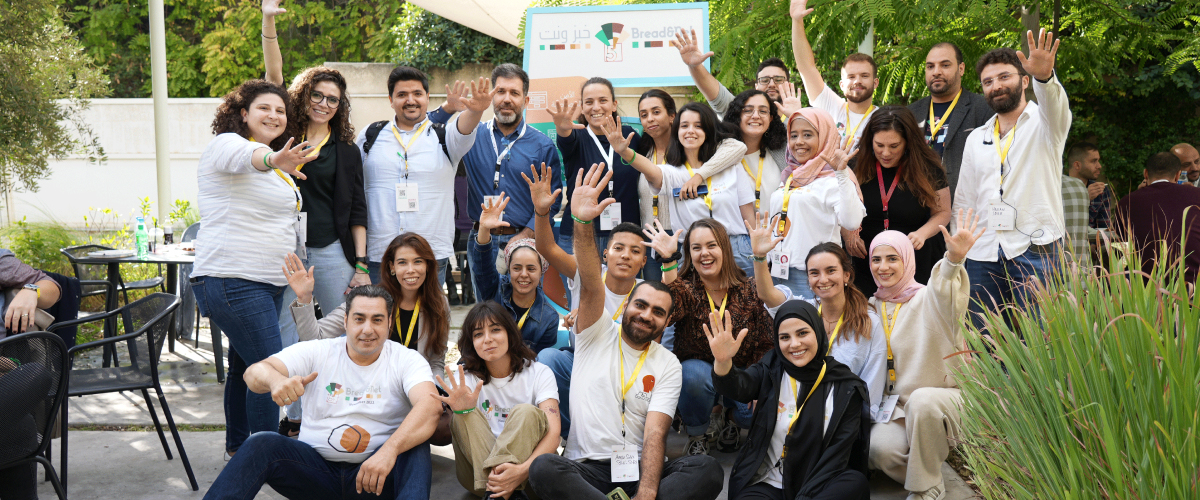This year’s turnout at Bread&Net exceeded our expectations! More than 800 attendees took part in what became the largest convention on human rights in the Arabic-speaking region.
In more than 100 sessions across 19 tracks, we addressed the most threatening challenges that restrict our rights and freedoms in the digital sphere. We also explored opportunities for collaborative advocacy and solidarity in the Arabic-speaking region and the diaspora.
For the fifth edition of Bread&Net, we reconnected with so many of our friends and partners after two years of meeting, organizing and advocating online. Seeing each other and holding discussions in person was a well-deserved respite for members of civil society in the region, especially after the global pandemic had restricted our movement and work on the ground.
In addition to these restrictions, participants from countries in the region also had to endure living under authoritarian states that deploy punitive measures against those who exercise their right to freedom of expression and speech. We’ve seen how over the years states colluded with social media companies to censor and manipulate the local online discourse in their respective countries. Governments have worked with private actors to develop intrusive technologies to spy on and prosecute activists and journalists. Internet shutdowns were rampant, as were attempts to drown social media platforms with disinformation and internet bots who swear allegiance to the regimes.
At Bread&Net, we met journalists, human rights defenders, and advocacy organizations working collectively to strengthen democratic resilience and address these issues despite growing threats. We found room for solidarity and paved the way for collective efforts to bolster digital rights and freedoms in the region. Many organizations and individuals were introduced to each other’s works, and old connections were renewed once more.
“This is the first time we meet in person for Bread&Net since 2019, it is obvious for us that the community has grown not only in numbers but also in depth in terms of the topics discussed,” said Mohamad Najem, executive director at SMEX. “I am optimistic that the digital rights networks in our region will keep growing despite the challenges in our region.”
But what really sets Bread&Net apart is its people. Over three days, attendees had the chance to learn more about the humans working behind the scenes: we met together over food and drinks, watched The Dissident, laughed (and cried) at a drag show, and said our goodbyes during the conference’s closing party.
We also held two competitions: one for young reporters on digital rights and another for writers interested in imagining an alternative future for our digital existence. The three selected writers are Sacha Robehmed, Ibrahim Jouhari, and Wadih Haddad. Some of the themes explored in the stories include harnessing the power of technology to transfer ancestral knowledge about nature to future generations, incorporating mandatory voting via smartphones, and using a seeding technology to seek and find stranded family members.
Key Sessions and Findings
Politics of Data
We investigated the implications of hosting data centers in Israel and authoritarian countries such as KSA and UAE. Fellow researcher Aksel Eck noted in one session that “Data is subject to the law of its geographical hosting country. While the countries where the physical data centers are being built have personal data protection laws in place, these laws use vague language, and contain loopholes and exceptions for cases related to ‘public authorities,’ ‘national security’ and ‘reputation.'” Afef Abrougui and Jessica Dheere shared in another session their findings from a new SMEX report that used the RDR methodology to assess the privacy and security policies of the Hayya App, a mandatory application that spectators need to download and use to enter Qatar and stadiums during the World Cup. The app’s privacy policy is a source of concern since it is not transparent about its collection, inference, sharing, and retention of millions of users’ information, falling short of RDR standards.
Internet Shutdowns
In a number of sessions on internet accessibility, speakers exposed how states have deployed internet shutdowns with impunity under different justifications. In Jordan, for example, the government claimed that it is a measure to curb cheating during national exams. In Sudan, it was to “protect national security” and “restrict foreign interference.” In reality, these measures have coincided with instances of political upheaval, as is the case in Iran today, where the internet is deliberately disconnected to throttle efforts for mass organization, isolate the population from reaching an international audience, and to conceal state aggression and crimes. An unreliable internet connection lowers economic activity and discourages innovation and investments, damaging states’ economies. Internet shutdowns impede attempts for digital transformation and infringe on people’s freedom of expression as well as their right to communication and access to information.
Gender-based Cyber Violence
The discussions also addressed the growing trend of online sexual and gender-based violence in our region, including cyber-bullying, cyber-harassment, doxxing, revenge porn, cyberstalking, and public shaming. Government and tech-companies have been very slow to respond to these threats, if they responded at all. Under topics at the intersection of technology and public health, we held sessions on the state of censorship of content relating to sexual and reproductive health and rights in the region. Similarly, ARTICLE 19 and Human Rights Watch presented their on-going research on digital repressions against queer communities in the MENA.
Content Moderation
Attendees had the chance to join a discussion with Oversight Board member Khaled Mansour and inquire about the mechanisms for deciding what content should be removed and reinstated and why. The Oversight Board sessions explored some of the challenges of global content moderation, and in particular the challenges facing the MENA region. Nonetheless, social media companies remain quite absent and unengaged when it comes to content moderation issues brought to them by the regional digital rights community. “Companies’ representatives never participate in regional conferences. They do not know the reality of digital rights,” noted Dia Kayyali, Associate Director for Advocacy at Mnemonic, a nonprofit organization that documents human rights violations and international crimes using digital evidence.
Digital Authoritarianism
How can we better support the fight for freedom of imprisoned internet activists in Arabic-speaking countries? The large number of internet activists who face prosecution for their peaceful and legitimate activities in the field of human rights has been a chronic problem in the region. As AccessNow’s Marwa Fatafta put it: “There are so many cases of people getting jailed for expressing an opinion online, and we have not the capacity to help them all. There are some emblematic cases like Alaa Abdel Fattah where #FreeAlaa means free them all.” Rachel Kay from IFEX proposed a reformed framework for effective advocacy which includes forging authentic collaborations, advancing political and institutional agendas by engaging with local, regional and international mechanisms, taking time to test, learn, and assess together, and cultivating care and experimentation in our approach.
Five Years in Review
2018
We can’t believe how far we’ve come since our first ever Bread&Net. When we met five years ago, we were no more than 200 people; today, our community has grown four-fold. In 2018, we proudly held 35 panel discussions—almost all entirely in Arabic—to probe diverse fields such as policy in difficult contexts, networks and communities, culture and knowledge production, and language and localization.
2019
The following year, Bread&Net coincided with the October uprisings that shook Lebanon in 2019–after which the country was never really the same. Fervent protests and nationwide solidarity called forth the spirit of revolution. Although the same ruling elite that were scorned and rejected in 2019 remain in power today, the uprisings created a new possibility for a revolutionary social consciousness. This seeped into our talks about digital rights, especially around freedom of speech, digital security and safety, and online mobilization and advocacy during political upheaval and social change. We held Bread&Net sessions in public squares and on the streets, and our discussions centered around creating networks of solidarity across different Arabic-speaking countries that were going through similar critical transitions.
2020-2021
During the two years of the pandemic, we held Bread&Net online and broadcasted the sessions live for the first time. It was an opportunity to expand the reach of the community and invite new voices, while allowing for greater accessibility for those who couldn’t join us in-person in previous years. The most prominent discussions centered around adjusting to a new reality of mostly digital presence. We addressed growing threats to data privacy and security, especially with COVID-19 contact-tracing apps, vaccination registration platforms, and vaccine e-passports. We reflected on digitization–accelerated by the pandemic– and how it completely changed our modes of expression, communication and governance.



